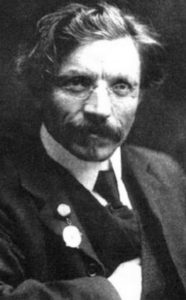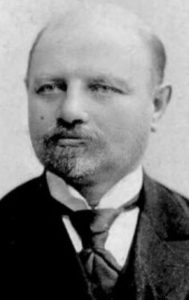The Jewish Mark Twain
 Sholem Solomon Alexei Rabinovich (1859-1916) was born to a wealthy family near Kyiv in what was then the Russian Empire. He grew up in the Jewish shtetl of Voronkiv, receiving both a secular education and a traditional Jewish one. His father lost most of the family’s fortunes, and his mother died of cholera when he was just 13. Rabinovich started writing around this time, and already at age 15 wrote a Jewish version of Robinson Crusoe. He wrote stories in Hebrew, Yiddish, and Russian. At 24, he took up the pen name “Sholem Aleichem”, the Yiddish pronunciation of the Hebrew greeting meaning “peace be upon you”. After completing his studies, he worked as a teacher and then as a “crown rabbi”, a representative of the Jewish community to the Russian government. He lost his own wealth in the stock market in 1890 and at one point struggled to make a living and feed his five children. By the end of the 1890s, Sholem Aleichem was the most popular Yiddish writer in the world, and inspired countless other young Jewish writers. He published Tevye the Milkman in 1894, which was later adapted to Fiddler on the Roof, becoming a major international hit (as well as a Broadway play—the first to run for more than 3000 performances—and a film). Rabinovich lived in Kyiv until 1905, when terrible pogroms raged across the Russian Empire and he witnessed the brutality firsthand. The family fled, splitting their time between New York City and Geneva, Switzerland. All in all, Sholem Aleichem wrote some 40 works in Yiddish, and many more in Hebrew and Russian. He was commonly referred to as “the Jewish Mark Twain”. (When Mark Twain himself heard about this, he said that he was actually “the American Sholem Aleichem”!) Rabinovich was a passionate Zionist, too, joining Hovevei Zion in 1888, and representing the American Jewish community at the Eighth Zionist Congress in 1907. There are streets, schools, and other public places named after him around the world, including in Argentina, Australia, Brazil, Israel, Lithuania, Russia, Ukraine, and the United States. There is even a Sholem Aleichem Crater on the planet Mercury! Rabinovich’s funeral drew some 100,000 mourners, making it among the largest in New York’s history. He wrote in his will: “Let my name be recalled with laughter, or not at all.”
Sholem Solomon Alexei Rabinovich (1859-1916) was born to a wealthy family near Kyiv in what was then the Russian Empire. He grew up in the Jewish shtetl of Voronkiv, receiving both a secular education and a traditional Jewish one. His father lost most of the family’s fortunes, and his mother died of cholera when he was just 13. Rabinovich started writing around this time, and already at age 15 wrote a Jewish version of Robinson Crusoe. He wrote stories in Hebrew, Yiddish, and Russian. At 24, he took up the pen name “Sholem Aleichem”, the Yiddish pronunciation of the Hebrew greeting meaning “peace be upon you”. After completing his studies, he worked as a teacher and then as a “crown rabbi”, a representative of the Jewish community to the Russian government. He lost his own wealth in the stock market in 1890 and at one point struggled to make a living and feed his five children. By the end of the 1890s, Sholem Aleichem was the most popular Yiddish writer in the world, and inspired countless other young Jewish writers. He published Tevye the Milkman in 1894, which was later adapted to Fiddler on the Roof, becoming a major international hit (as well as a Broadway play—the first to run for more than 3000 performances—and a film). Rabinovich lived in Kyiv until 1905, when terrible pogroms raged across the Russian Empire and he witnessed the brutality firsthand. The family fled, splitting their time between New York City and Geneva, Switzerland. All in all, Sholem Aleichem wrote some 40 works in Yiddish, and many more in Hebrew and Russian. He was commonly referred to as “the Jewish Mark Twain”. (When Mark Twain himself heard about this, he said that he was actually “the American Sholem Aleichem”!) Rabinovich was a passionate Zionist, too, joining Hovevei Zion in 1888, and representing the American Jewish community at the Eighth Zionist Congress in 1907. There are streets, schools, and other public places named after him around the world, including in Argentina, Australia, Brazil, Israel, Lithuania, Russia, Ukraine, and the United States. There is even a Sholem Aleichem Crater on the planet Mercury! Rabinovich’s funeral drew some 100,000 mourners, making it among the largest in New York’s history. He wrote in his will: “Let my name be recalled with laughter, or not at all.”
Who are the Indigenous People of Israel?
Words of the Week
Life is a dream for the wise, a game for the fool, a comedy for the rich, a tragedy for the poor.
– Sholem Aleichem




